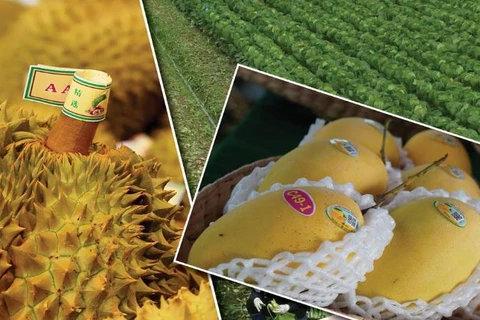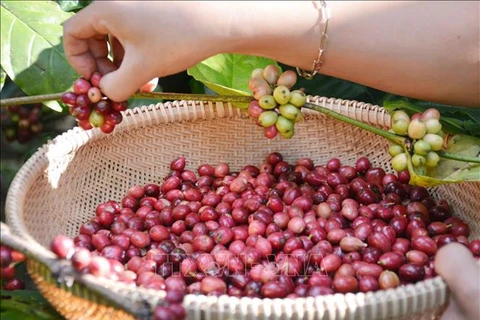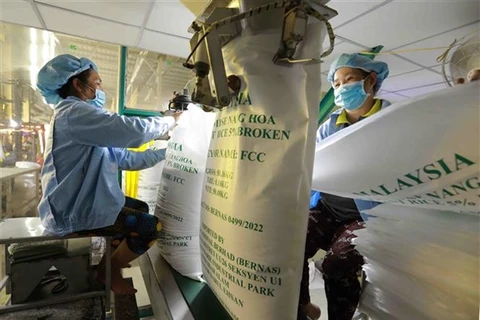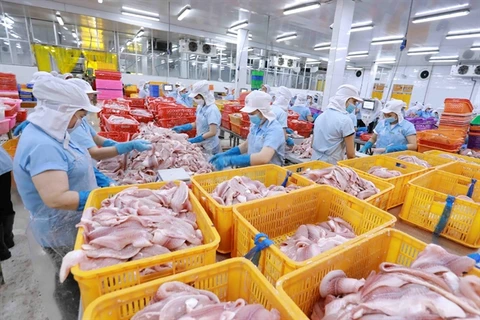Hanoi (VNA) – Suffering from declined overseas shipments, export businesses in some industries now need more assistance from the Government to navigate difficulties and challenges, insiders have said.
Together with public investment and consumption, export is identified as one of the three drivers of Vietnam’s economic growth.
However, amid unpredictable and complex developments in the global economy, especially the tightening of monetary policies in many countries, global trade has slowed down.
Le Tien Truong, Chairman of the Vietnam National Textile and Garment Group (VINATEX), said textile and garment exports started worsening in the final months of 2022, and there haven’t been any signs of improvement. The shortage of orders is a common phenomenon among businesses in the industry. Meanwhile, Vietnam's rivals like Bangladesh, India, and Turkey have recorded contrary results.
Besides, the shares of Vietnamese textile and garment are now on a downward trend in such markets as the US, the EU, and the Republic of Korea, he pointed out.
That fact is partly attributable to many markets shifting their orders to the producing countries with geographical advantages. However, the main cause comes from the relatively weak competitiveness of Vietnam’s textile and garment businesses, which are facing an array of challenges in terms of capital, interest rates, logistics cost, and salary expense, and many trade barriers, he went on.
In addition, Truong said, Vietnam is no longer a producer with the advantage of cheap labour. Businesses are also encountering difficulties related to machinery and technology upgrade while their capacity remains modest, leading to limited labour productivity and competitiveness.
Echoing the view, Secretary General of the Vietnam Association of Seafood Exporters and Producers (VASEP) Truong Dinh Hoe noted the fisheries sector has seen many complex developments over the past years, including unstable material supply, price volatility, soaring production costs, and increased anti-dumping duties in the US market, resulting in worsening imbalance between material production and export processing.
Businesses have also continually faced new challenges such as increasing technical barriers, the US’s seafood import monitoring programme, the “yellow-card” warning over illegal, unreported and unregulated (IUU) fishing from the EU, and China’s tightened control over cross-border trade, which all have mounted pressure on aquatic exports, he added.
Ramla Khalidi, Resident Representative of the UN Development Programme (UNDP) in Vietnam, recommended the Government continue support policies for exporters, especially domestic ones, strive to increase the country’s global market share for the commodities and services Vietnamese firms can supply, and pay more attention to the companies working in the industries of sustainability like renewable energy and energy efficiency.
It is also highly important to develop domestic exporters so as to reduce the overdependence on foreign invested businesses, she opined, suggesting Vietnam maintain the job creation speed, particularly in the sectors that can post fast productivity growth, to boost advantages for export sectors in the future.
For his part, Hoe suggested the Government extend the reduction of corporate income tax for the firms meeting sustainability standards and provide concessional loans for green factory, green transition, and circular business projects./.
Together with public investment and consumption, export is identified as one of the three drivers of Vietnam’s economic growth.
However, amid unpredictable and complex developments in the global economy, especially the tightening of monetary policies in many countries, global trade has slowed down.
Le Tien Truong, Chairman of the Vietnam National Textile and Garment Group (VINATEX), said textile and garment exports started worsening in the final months of 2022, and there haven’t been any signs of improvement. The shortage of orders is a common phenomenon among businesses in the industry. Meanwhile, Vietnam's rivals like Bangladesh, India, and Turkey have recorded contrary results.
Besides, the shares of Vietnamese textile and garment are now on a downward trend in such markets as the US, the EU, and the Republic of Korea, he pointed out.
That fact is partly attributable to many markets shifting their orders to the producing countries with geographical advantages. However, the main cause comes from the relatively weak competitiveness of Vietnam’s textile and garment businesses, which are facing an array of challenges in terms of capital, interest rates, logistics cost, and salary expense, and many trade barriers, he went on.
In addition, Truong said, Vietnam is no longer a producer with the advantage of cheap labour. Businesses are also encountering difficulties related to machinery and technology upgrade while their capacity remains modest, leading to limited labour productivity and competitiveness.
Echoing the view, Secretary General of the Vietnam Association of Seafood Exporters and Producers (VASEP) Truong Dinh Hoe noted the fisheries sector has seen many complex developments over the past years, including unstable material supply, price volatility, soaring production costs, and increased anti-dumping duties in the US market, resulting in worsening imbalance between material production and export processing.
Businesses have also continually faced new challenges such as increasing technical barriers, the US’s seafood import monitoring programme, the “yellow-card” warning over illegal, unreported and unregulated (IUU) fishing from the EU, and China’s tightened control over cross-border trade, which all have mounted pressure on aquatic exports, he added.
Ramla Khalidi, Resident Representative of the UN Development Programme (UNDP) in Vietnam, recommended the Government continue support policies for exporters, especially domestic ones, strive to increase the country’s global market share for the commodities and services Vietnamese firms can supply, and pay more attention to the companies working in the industries of sustainability like renewable energy and energy efficiency.
It is also highly important to develop domestic exporters so as to reduce the overdependence on foreign invested businesses, she opined, suggesting Vietnam maintain the job creation speed, particularly in the sectors that can post fast productivity growth, to boost advantages for export sectors in the future.
For his part, Hoe suggested the Government extend the reduction of corporate income tax for the firms meeting sustainability standards and provide concessional loans for green factory, green transition, and circular business projects./.
VNA


























